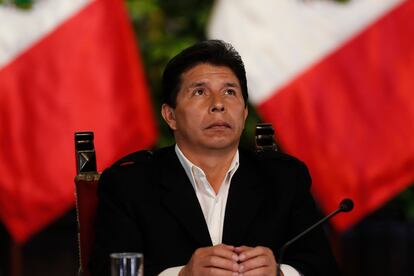President Pedro Castillo of Peru faces new corruption accusation
Attorney general files constitutional complaint in parliament alleging Castillo heads a criminal organization that controls bidding processes to obtain illicit gains

Peru’s Attorney General Patricia Benavides on Tuesday filed a constitutional complaint against President Pedro Castillo, accusing him of leading a criminal organization after finding evidence of influence-peddling and acts of collusion.
The complaint, the first of its kind against a sitting president, was lodged with Congress, which must now consider the future of the leftist leader. Castillo is already dealing with six investigations into issues ranging from graft to plagiarism. Not since the 2021 elections, which further fragmented an already divided country, has Peru experienced such a heated political atmosphere.
“I am filing a constitutional complaint against José Pedro Castillo Terrones, in his capacity as president of the Republic, as the alleged perpetrator of crimes against the public peace in the form of a criminal organization aggravated by his position as leader,” Benavides wrote in a document posted on Twitter.
The Public Prosecutor’s Office on Tuesday ordered the arrest of five former Castillo advisers and a search of the offices and homes of six members of Congress also involved in the probe. The searches extended to the home of the president’s sister, Gloria Castillo, who was in the company of her mother, in San Juan de Lurigancho, a district east of Lima. This was branded as an “abusive act” by the president himself hours later.
Here I am and if my blood has to flow in the streets for the benefit of the people, then so be it. If I have to give my life, I willPresident Pedro Castillo
The complaint also involves two former Castillo ministers: Juan Silva Villegas (Transportation and Communications), who is currently on the run, and Geiner Alvarado López (Housing, Construction and Sanitation).
In a Twitter post, Benavides was emphatic in her accusation. “We have found serious indications of the alleged existence of a criminal organization entrenched in the government palace with the purpose of monopolizing, controlling and steering bidding processes in order to obtain illicit gains,” read the document.
This type of constitutional complaint, filed in parliament, is leveled against high-ranking officials who otherwise enjoy immunity from prosecution. The move leaves the ball in the court of the legislative branch, which is controlled by parties opposed to Castillo. “From this moment on, it is the exclusive responsibility of the Congress of the Republic to decide on the proccessing of the constitutional complaint within the framework of the United Nations Convention against Corruption,” said Benavides’ office.
It would require at least 66 votes out of 130 to suspend Castillo, whose alliance holds a third of the seats in parliament.
Castillo flatly denied the accusations in a press conference, during which he stated that “the execution of a form of coup d’état has begun in Peru.” In a dramatic statement, he suggested that he was willing to die for his fellow countrymen. “Here I am and if my blood has to flow in the streets for the benefit of the people, then so be it. If I have to give my life, I will.”
In any event, the accusations are extremely serious and they target an executive that has been struggling with instability, resignations and dismissals since Castillo, a schoolteacher by trade, took office in late July 2021. The attorney general talked about “permanent intimidation” and “harassment” against prosecutors and the National Police, which “seriously endangers the continuity of the investigations and the discovery of the truth that all Peruvian people expect to know.”
Tu suscripción se está usando en otro dispositivo
¿Quieres añadir otro usuario a tu suscripción?
Si continúas leyendo en este dispositivo, no se podrá leer en el otro.
FlechaTu suscripción se está usando en otro dispositivo y solo puedes acceder a EL PAÍS desde un dispositivo a la vez.
Si quieres compartir tu cuenta, cambia tu suscripción a la modalidad Premium, así podrás añadir otro usuario. Cada uno accederá con su propia cuenta de email, lo que os permitirá personalizar vuestra experiencia en EL PAÍS.
¿Tienes una suscripción de empresa? Accede aquí para contratar más cuentas.
En el caso de no saber quién está usando tu cuenta, te recomendamos cambiar tu contraseña aquí.
Si decides continuar compartiendo tu cuenta, este mensaje se mostrará en tu dispositivo y en el de la otra persona que está usando tu cuenta de forma indefinida, afectando a tu experiencia de lectura. Puedes consultar aquí los términos y condiciones de la suscripción digital.








































